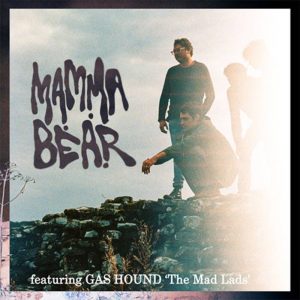In the often maddening fray of an arduous road-trip through the vast heart of the merciless American wilderness, music, in all its unimaginable variations and unprecedented subgenres, there lies an anomaly, an album—unapologetic in its vigor and ruthless in its audacity. The Mad Lads, brought to you live into existence in an unexpected twist, in the most unlikely of places—a humble club in Cambridge, the home of rock & roll. Flipping open the cyberspace labyrinth of the Six Six Bar’s social media manifesto, your eyes may have collided with the flamboyant expression, christening them as the mad lads of MammaBear. It’s an outrageous declaration dripping with tongue-in-cheek audacity; a playful devil’s advocate reflecting their off-the-wall banter in text form.
Reaping the benefits of the title, MammaBear, decked in retro-inspired apparel and rocking stages, seizes your senses, grabs your attention and initiates a bizarre yet irresistibly engrossing pilgrimage to the far side of a high energy frenzy. The primary sensation is not mere excitement; it’s akin to vertigo—a dizzying trip down an electrically-charged rabbit hole of percussion, melodies and manic choruses. Even in its high decibel effusion, MammaBear’s creative odyssey offers more than just cacophony; it presents an enigma that unravels with every passing track.
A grand Shakespearean tragedy for modern Romeo and Juliets, here emerges, “I Love You To Death.’” A grotesque homage of sound and incessant rhymes that somehow got tangled up in the tragic existence and premature extinguishment of a Hollywood sweetheart, one River Phoenix. MammaBear, the antithesis of the antiquated stereotype sex, drugs, and rock & roll, manages to pay a tribute to an attempted murder. This dark ballad of gritty storytelling, he conjures an image that is painful and undeniably mesmerizing, like the flame that is so brightly blinding and utterly alluring in its inevitable burnout. “I Love You To Death” is no cheerful tune to hum along to. Instead, its refrain remains in its melancholic depth: Love me. Leave me. Or damned be she who tries to deceive me.
Diving into the murky abyss of “Gas Hound – Knife” and “Gas Hound – 9mm,” there lurks a mysterious underbelly-cum-progeny of a four-headed beast hewn from worn out vinyl grooves; a phonographic menace yet mesmeric symphony of a bygone era. Gas Hound, a post-gonzo grit of MammaBear who’s skirting the dark edges of American music—walks a line where blues bleed into psychedelic grunge, where rock & roll flirts with folk noir, and lyrics seemed borrowed from gothic novels. Today we’ll run our reckless and depraved hands over the shrieking anthem, Knife You’d be mistaken if you anticipated some adolescent celebration of delinquency here; this is not it. The blade doesn’t just stand as a symbol of mindless violence; it’s the poet’s old muse—an omnipotent instrument of creation and destruction, sculpting lyrics into raw existence.
This is no lullaby for the squeamish, but a beguiling tune for those whose ears yearn for disquieting beauty. “Knife” serves as a warped confessional, the feral lament “9 millimeter” can be seen as Gas Hound’s “Stairway to Heaven.”MammaBear leverages lyrical repetitions, offering an interesting riff on the myth of perennial cyclic time to create the paranoid spectacle of “9mm,” portraying an apocalyptic landscape filled with burnt-out taverns, razor ridges and grim hellos. So buckle up, disciples of dread, and take a long gulp of this intoxicating ballad of societal decay.
“Please Don’t Go,“ a heartfelt plea against the daunting prospect of abandonment—a stranger with broken wings; a melancholic ode to fleeting connections. The anguished voice of MammaBear, blends heart-wrenching narratives with sultry melodious blues that wail like a jukebox banshee. Every note hums with memories of youth soaked in turpentine and lit ablaze; the singed remnants are a tale of love and loss, desperation, betrayal and heartbreak. You hear the inner cry for someone who’s soared too high, their wings clipped, descending until it disappears, unearthed in the dust. A parallel of Lucifer fallen from grace, the once bright flame now just a whisper in a name. You can’t always get what you want, but perhaps this is exactly what you need.
“Anthem of the Damned” crashes into the public consciousness like a drunken, raging bull in a porcelain shop. Far more sinister, far more intoxicating. Imagine diving head first into a neon-lit pool of napalm, the searing heat licking your veins and igniting your soul as you plunge into depths unknown. That, my friends, is the essence of this damned anthem. You know you’ve been baptized in the cleansing fire of filth when you can taste the ash on your tongue.
MammaBear doesn’t just acknowledge the darkness; he dances with it, romances it. And perhaps that’s the most transcendent magic of music—the ability to transform despair into a shared experience of resilience, making us feel a little less damned ourselves. He gives us a mirror and tells us, unflinchingly, to take a hard look—providing us not only solace, but understanding—and therein lies the beauty ofThe Mad Lads. MammaBear, within this energetic tumult, captures and communicates humanity’s seemingly indefinable sensation; if that’s not high energy frenzy, I’m uncertain as to what else can claim to be.

